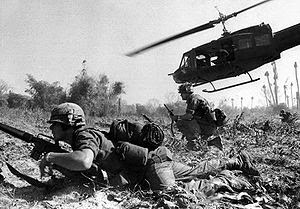- Public Policy
- Leadership
- Funding
- News & Events
- About the Center
Back to Top Nav
Back to Top Nav
Back to Top Nav
Back to Top Nav

In his talk based on his new book “Embers of War: Vietnam Reconsidered," Professor of History and International Studies at Cornell University Fredrik Logevall brought the Vietnam War out of isolation and into the context of world events.
The conflict began long before U.S. involvement occurred. Vietnam had been part of one of the most lucrative French colonial territories, French Indochina, since the late 1800’s. However French control and influence waned as a result of the strain of WWII. France believed that to regain its Great Power status after the war, it had to reconquer its previous colonies, including Vietnam. Somehow the French failed to see that the freedom they had gained for themselves from the Nazis might be just as important to the people of its previous colonies. This led to the bloody First Indochina War, which began in 1946 and continued through 1954, despite increasing reluctance on the part of the French and growing encouragement from the U.S. Although the U.S. originally disapproved of the French war in Vietnam, rising concerns about Ho Chi Minh’s connection to Moscow prompted the U.S. to become more involved, eventually leading to French departure and U.S. engagement in Vietnam.
What struck me was the similarities between the French and American wars in Vietnam. Both France and the U.S. underestimated the nationalism and determination of the Viet Minh, and failed to recognise that any victory in Vietnam would have to be political as well as military. In both cases the war was continued due at least in part to the re election concerns of French and American politicians. Finally, Professor Logevall made it clear that the wars in Vietnam could have been avoided, in part because of Ho Chi Minh’s admiration for the U.S., and his desire to gain recognition and legitimacy from the U.S. after WWII.
--Walker Sales, MLDP Spring 2014 Participant